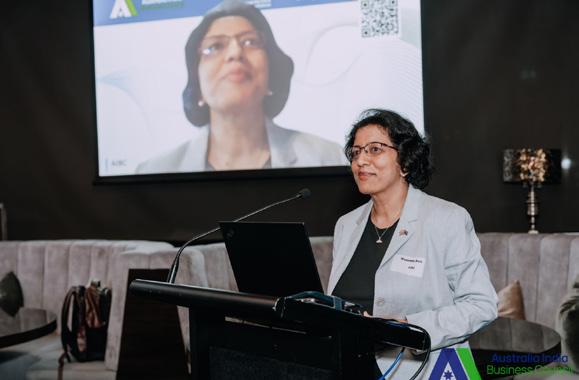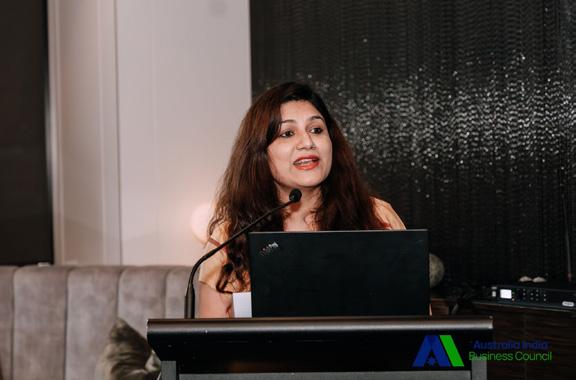
4 minute read
AIBC Queensland hosts key session on India’s Union Budget 2025 & trade opportunities
Brisbane, March 14 (Australia India News Newsdesk)
The Australia India Business Council (AIBC) Queensland successfully hosted a networking event at Sofitel Brisbane, providing in-depth insights into India’s Union Budget 2025 and its implications for Australian businesses. The session featured analysis from Ernst & Young (EY) India leaders, alongside reflections on the QueenslandIndia trade relationship from key stakeholders.


AIBC’s role in fostering bilateral trade
The event commenced with a welcome address by Namrata Datt, President of AIBC Queensland, who highlighted the AIBC’s three-decade-long role in fostering India-Australia trade relations. She acknowledged the Indian Consulate in Brisbane, represented by Consul General Neetu Bhaagotia, and the Queensland government’s strong support through Trade and Investment Queensland (TIQ), led by CEO Justin McGowan.


India’s Union Budget 2025: A blueprint for growth
Consul General Neetu Bhaagotia emphasized that India’s Union Budget 2025 serves as a blueprint for economic growth, promoting sustainability, stability, and inclusivity. She highlighted the Indian Consulate’s role as a bridge between Indian and Australian businesses, providing crucial connections to Indian ministries, trade bodies, and industry leaders. She also encouraged Australian businesses to engage directly with the consulate for insights on India’s investment landscape.

Queensland-India trade mission & expanding economic ties
TIQ CEO Justin McGowan reflected on the recent Queensland-India trade mission, led by Governor of Queensland, Dr. Jeannette Young AC PSM, and Minister for Finance, Trade, Employment, and Training, Rosslyn Bates. He highlighted that this visit gave leaders firsthand insights into India’s scale, complexity, and market potential. McGowan noted that India remains a key trade priority for Queensland, with sustained efforts to strengthen economic ties. The trade mission included visits to BioAsia in Hyderabad, a sports summit in Gujarat, and business meetings with Indian officials, ministers, and industry leaders. He emphasized that 70% of Australia’s exports to India come from Queensland, reinforcing the state's strong economic partnership. He also pointed out Queensland’s vital role in supplying metallurgical coal, which is essential for India’s "Make in India" initiative.
Boosting trade & investment opportunities

The Queensland government is expanding its trade footprint in India, with TIQ opening a new office in Mumbai and increasing its staff presence to support business expansion and trade growth. McGowan also highlighted Queensland’s push to promote fresh produce exports to India, including avocados, macadamias, and chickpeas.
Key takeaways from India’s Union Budget 2025
Senior EY India leaders Sameer Gupta, Uday Pimprikar, and Samir Kanabar provided an in-depth analysis of India’s Union Budget 2025, covering economic reforms and trade policies. They noted that India’s economy is projected to grow at 6.5% in FY25 and could reach 7% in FY26, maintaining its position as the world’s fastest-growing large economy. The budget introduced income tax relief for the middle class, raising the tax-free threshold to ₹12 lakh, which is expected to boost domestic demand and consumption. The Indian government continues to push for manufacturing and exports, expanding Production-Linked Incentive (PLI) schemes to new sectors such as defence and pharmaceuticals. These policies open new business opportunities for Australian companies looking to invest in India’s growing industrial sector. The budget also includes significant Foreign Direct Investment (FDI) reforms, raising the FDI limit in the insurance sector to 100% and allowing automatic FDI approvals in more industries, which is expected to foster closer business collaborations between India and Australia.
GIFT City & financial sector reforms
The financial services sector also received a boost, with GIFT City in Gujarat positioned as a global financial hub offering tax incentives and regulatory ease to attract foreign investors. The AI-ECTA (Australia-India Economic Cooperation and Trade Agreement) is playing a key role in accelerating bilateral trade, particularly in natural resources, pharmaceuticals, machinery, and IT services. Queensland’s avocados are now available in India, while Indian pomegranates have entered the Brisbane market, marking significant progress in agricultural trade between the two nations.
Trade tariff reforms & digital taxation
Further customs tariff reforms have been introduced, reducing average tariff rates and simplifying trade regulations. Key manufacturing sectors, including critical minerals and textiles, have benefited from tariff reductions, making trade with India more accessible for Australian businesses. India is also advancing its digital taxation policies, implementing a faceless tax audit system and streamlining GST compliance through new mechanisms like the Invoice Management System (IMS).
Strengthening Australia-India economic partnerships
The session concluded with an interactive Q&A, reaffirming the strong commitment to strengthening the Australia-India economic partnership. With growing trade opportunities and policy alignment, Queensland is set to play a pivotal role in deepening its engagement with India’s rapidly expanding economy.










